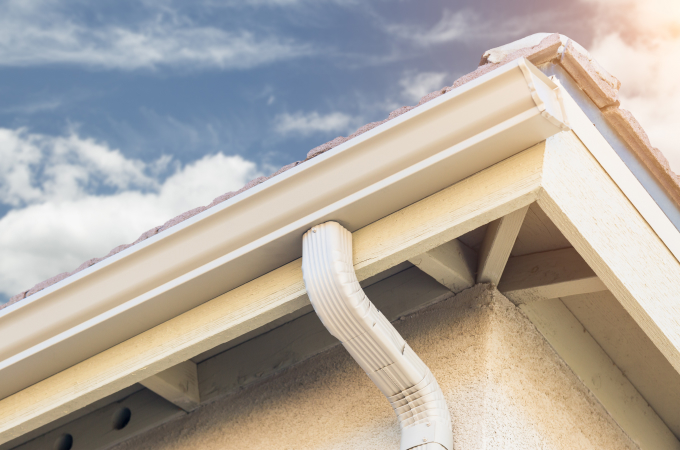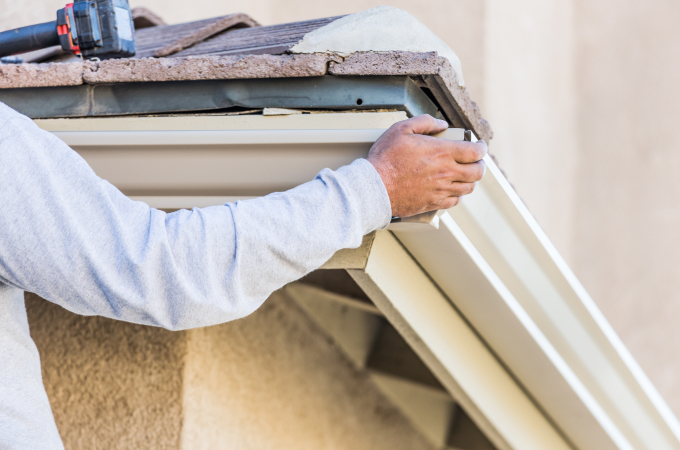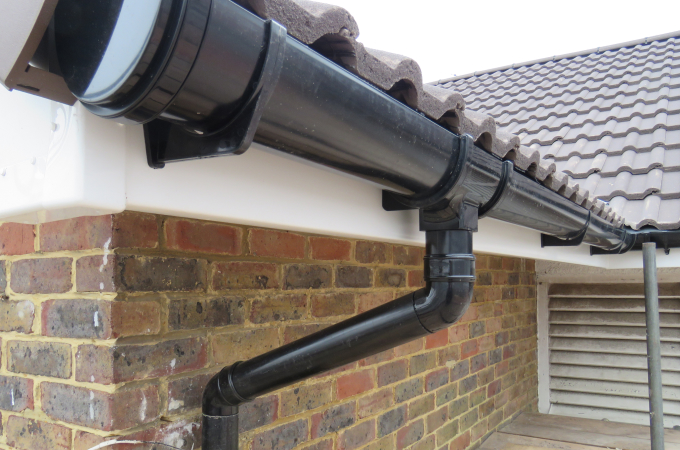Rain gutters play an important role in the functionality of a home or business. When it’s time to decide on the kind of new gutters to install, there are some important factors to consider.
Many homeowners and business owners find themselves questioning which of the two most popular gutter materials– steel or aluminum– are better at reducing water damage over time. While there are a variety of gutter materials on the market ranging from PVC, zinc, and copper gutters, aluminum and steel gutters tend to be a popular choice for a variety of reasons.
Taking time to evaluate whether aluminum gutters or steel gutters are best for your home is worth the effort. Pairing the right metal gutter material to your home or business not only saves you money in the long run but can potentially save you time, energy, and stress as well.
Comparing Materials: Steel vs Aluminum Gutters
Landing on the best option for your property begins with a closer look at the primary material differences and how they might affect long term outcomes.
Steel was long thought of as the go-to material for gutters thanks to its durability, corrosion resistance, and toughness. Steel can also be galvanized, which provides gutters with a protective zinc coating applied to reduce the likelihood of rust build-up over time.
It wasn’t until the 1960s that aluminum gutters hit the market and provided consumers with an alternative to steel options. Aluminum is appreciated as a lightweight but durable material that functions as an efficient heat conductor. It is also more easily roll formed than steel by fabricators and is a non-magnetic material.
Questions of Cost
Typically, when looking at questions of galvanized steel gutters vs aluminum gutters, consumers can expect aluminum options to be slightly less expensive overall. The final price tag associated with steel vs aluminum gutters tends to vary depending on geographic location, but there are some averages that can help consumers make informed decisions.
In general, aluminum will cost consumers approximately $2 per linear foot for the materials, while steel runs at an average of $3 per linear foot for the materials. That means for every 140-feet of material , aluminum gutters tend to average anywhere from $840 to $1,400. In comparison, 140-feet of steel gutters could average between $980 and $1,680.
While upfront costs for both aluminum and steel gutters aren’t drastically different, there are certain installation factors that can further raise the price of steel gutters over aluminum gutters. Aluminum is innately more flexible than steel which makes the installation process less involved. In fact, many homeowners and business owners who prefer DIY projects over paying professional installers opt for aluminum because it can be installed with relative ease.
Alternatively, steel gutters require more effort and labor to put in place, and the number of gutter, downspouts and elbow machines that can produce the steel gutters are limited which could add additional costs. This makes the steel gutter installation process generally more expensive as gutters have to be specially formed prior to being put on a home or business. Generally, it is not recommended to make steel gutters a do-it-yourself project.
Making Decisions Based on Durability
Extreme Weather
When considering steel vs aluminum gutters, it’s important to consider your climate. Steel gutters are very durable, and galvanized steel products in particular hold up well in extreme weather conditions. Their one downfall is that they tend to rust over time. So while they may hold up better in severe winter and icy conditions, the standing ice, snow and water can speed up the oxidation process and lead them to rust out faster.
Alternatively, aluminum gutters may crack and bend in climates where extreme temperature fluctuations are the standard as aluminum will expand and contract much more thn steel gutters. .
Leaks
Leaks are a major concern for any type of gutter system and when it comes down to picking and choosing between aluminum and steel varieties, aluminum is more prone to leakage. This is in large part due to the gutters expanding and contracting over time which can cause the seams to leak.
In contrast, steel gutters come with the added benefit of being able to be installed as a seamless gutter system without jointed sections that will not expand and contract as much. .
Rust & Corrosion
While aluminum is more easily dented and more prone to cracking and splitting with rapid temperature fluctuations, aluminum is a rust-proof metal, meaning that they are generally more low maintenance than steel. And, even though aluminum is more prone to denting, it is still very durable– the thickest aluminum gutters can endure fallen tree branches, heavy snowfall, and ice.
It’s also important to look at the surrounding materials that will come in contact with the gutters before deciding whether steel gutters vs aluminum gutters are better for your home or business. Both steel and aluminum will have galvanic reactions when installed in proximity of dissimilar metals. Steel, when in contact with copper, will lead to galvanic corrosion of the steel and will cause it to rust out faster. Aluminum, while not completely compatible with copper, will not have nearly the galvanic reaction than that of copper and steel.
Steel gutters are undoubtedly more durable and will keep its shape and profile much longer. . They’re also harder to dent and hold up well in the heat. Steel, however, is not a rust-free metal, so it takes a bit more work to maintain. In general, steel is slightly more prone to the elements over time as zinc coatings wear off.
Longevity
When it comes to longevity, both aluminum and steel gutters have a lifespan of approximately 20-years when properly maintained. Within that time frame, aluminum gutters will need to be carefully monitored for dents and leaks. .
Steel gutters need a bit more maintenance. Homeowners with steel gutters should expect to keep them clean to keep the water flowing and not not allow standing water for long periods of time. , Similarly, it’s important to make regular inspections of the zinc coating and any new rust spots a part of the regular maintenance plan to get the most out of your gutters.
Let Gutter Supply Help You Decide
Gutter Supply is the industry leader in both aluminum and steel gutter systems. Check out our online selection of products or reach out at (888) 909-RAIN for more information on how to decide which gutter material is best for your home or business.
 Contractors
Contractors



